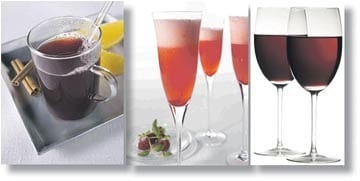
But all in all, our new year’s resolution, young or old, male or female, is to look after ourselves better. It will mean forming some sort of regime to kick start the new you and boot out some indulgent habits.
Now, at this point, I will say that I have a few New Year’s food resolutions that I will be trying to adhere to. But, before I banish alcohol, and in this case wine, from my menu, there are a few things you should consider before taking such drastic measures. Reducing your intake of alcohol might certainly be in order, but there is a lot of medical evidence that shows that moderate alcohol can be part of a healthy diet. Even beyond the proven medical implications of wine consumption, there are several factors that argue in favour of incorporating wine into a reduced calorie diet! A recent online study indicated more and it started with tannins. They are one of the fundamental components of wine, and red wines in particular. They add structure to the wine giving wine that mouth puckering, drying quality. That puckering quality is the astringent action of the tannins on the lining of your mouth. It literally draws the skin tightly together.
Now imagine what happens in your stomach when you enjoy a glass of wine before dinner. Those same tannins work their magic on the lining of the stomach, drawing it a little tighter and perhaps starting you on your way to fullness well before you’ve eaten your first bite.
Eat slower
We all know the saying that our eyes are bigger than our stomachs. Typically, it’s always said after an excessive meal, one in which we eat well past fullness because our bellies’ perception of fullness always seems to lag behind that of our mischievous minds. The key to helping those two levels of perception sync up is to slow down your eating. There are many ways to do that, from chewing thoroughly to having several small courses during a meal instead of one big one, but adding a glass of wine to your meal might help as well.
Small indulgences will satisfy
Think about it, a fantastic morsel of chocolate is much more satisfying than a brick of mediocre chocolate. A few thin slices of the best cured Parma will blow a stack of watery slices of ham out of the water when it comes to feeding your soul. We eat primarily to survive, though considering we are talking about going on a diet; it seems obvious we’ve gone past that point. Think of a small glass of good wine as the same.
Pairing
You might be surprised about mentioning that pairing wine with the food you eat is an important factor, but it is beneficial on two fronts. The first creates a result of hopefully using better, healthier ingredients while you cook. The second takes more effort on your part. It requires you to think more closely about what you put in your body, and not only the quality but the quantity of any given item you might be consuming as well.
“Compared with non-drinkers, initially normal-weight women who consumed a light to moderate amount of alcohol gained less weight and had a lower risk of becoming overweight and/or obese during 12.9 years of follow-up.”
Of course, there are many factors that might have influenced this conclusion. Interestingly, this seems to apply only to women and not to men, though apparently it has more to do with how men and women account for alcohol in their diet. It seems that women will tend to replace food calories with alcohol calories more than men, who simply add a few beers to their daily consumption.






